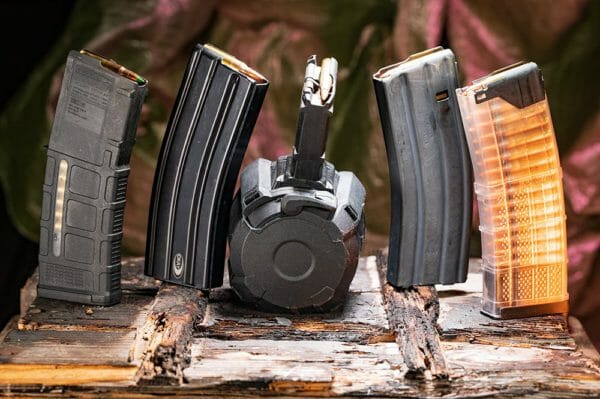
U.S.A. –-(AmmoLand.com)- As promised days ago, the Second Amendment Foundation has filed a federal lawsuit in U.S. District Court in Portland, Oregon challenging provisions of Ballot Measure 114, the gun control initiative opponents called “extreme,” making it the second legal challenge against the measure, which is scheduled to take effect Dec. 8.
The 30-page complaint names Oregon Attorney General Ellen Rosenblum and State Police Supt. Terri Davie, in their official capacities, as defendants.
In addition, SAF and its partners also filed a 15-page emergency document detailing motions for a temporary restraining order and preliminary injunction against the initiative, which was passed by voters Nov. 8. Timing is critical because of the looming effective date of the new law, which bans so-called “high capacity” magazines, requires training by law enforcement before an Oregon resident can buy a firearm, and requires a permit issued by police just to buy a gun.
SAF is joined by G4 Archery, Grayguns, Inc., the Firearms Policy Coalition and a private citizen, Mark Fitz. They are represented by attorney James L. Buchal, Murphy & Buchal LLP in Portland.
As reported earlier by Ammoland, the Oregon Firearms Federation is also challenging the law in federal court, and an initial hearing on that action is slated this Friday, Dec. 2.
Another legal action is anticipated from the National Shooting Sports Foundation.
In a statement announcing the lawsuit, SAF founder and Executive Vice President Alan Gottlieb observed, “Maybe the most frustrating thing about the Oregon measure is that officials there are willing to enforce the law’s provisions despite any real prospect this law is going to reduce violent crime. The only people actually impacted are law-abiding citizens who don’t commit crimes, and who will be left more vulnerable to attack because of this new law.”
He’s not the only critic of the law. Portland-based radio host Lars Larson has been a vocal critic since the measure made it to the Oregon ballot months ago.
OFF’s Kevin Starrett has predicted the law will put many local gun stores out of business because of its requirements, and he has also said law enforcement has neither the manpower or the facilities to provide training, which includes live fire exercises.
SAF Executive Director Adam Kraut said the action is necessary because the Oregon measure outlaws commonly-owned standard capacity magazines owned by millions of citizens around the country, including Beaver State residents. The complaint notes that “As many as half a billion of these standard capacity magazines have been owned by Americans throughout the United States.”
“As we immediately explain in our lawsuit,” Kraut said, “the State of Oregon has criminalized one of the most common and important means by which its citizens can exercise their fundamental right of self-defense. By banning the manufacture, importation, possession, use, purchase, sale, or transfer of standard-capacity magazines that can hold more than 10 rounds the State has barred law-abiding, peaceable residents from legally acquiring or possessing common ammunition magazines and deprived them of an effective means of self-defense.”
The ban may be unenforceable, amounting to one more piece of symbolism for the gun prohibition lobby, which supported Measure 114 with hefty out-of-state contributions.
Under conditions of the measure, people who currently own magazines capable of holding more than ten cartridges may continue to own and use them, with strict limitations. But since magazines are not serialized, nor are there dates of manufacture stamped anywhere on them, it will be impossible for authorities to determine whether they are new or have been owned for a while. And some Oregon sheriffs have already announced they will not enforce the magazine prohibition.
In their emergency motion, the plaintiffs note that firearms dealers and manufacturers “will only be allowed to sell non-compliant magazines to military or law-enforcement buyers and even then only if the magazines have been manufactured with a permanent stamp indicating they were created after the effective date of Measure 114 and was produced in compliance with it. And Oregon citizens who already possess magazines holding more than 10 rounds of ammunition will be barred from acquiring new magazines and required to use their old magazines only under limited circumstances—circumstances that notably exclude carriage in public for self-defense.”
The motion also reminds the court, “The Ninth Circuit previously held, in Duncan v. Bonta, that such a regulation is permissible under the Second Amendment, but that decision was vacated by the Supreme Court…in light of its decision in Bruen.”
This is one more indication of the far-reaching implications of the Supreme Court’s June 23 ruling in New York State Rifle & Pistol Association v. Bruen, which struck down a century-old concealed carry law in New York, but more importantly rejected “means-end scrutiny” in Second Amendment cases. Henceforth, courts will be required to consider only whether a gun control law has some historical foundation.
Timing of these lawsuits is important for another reason. SAF is already challenging a ban on so-called “high capacity” magazines adopted in neighboring Washington. There will likely be plenty of turmoil over guns and magazines on both sides of the Columbia River heading into 2023.
RELATED:
About Dave Workman
Dave Workman is a senior editor at TheGunMag.com and Liberty Park Press, author of multiple books on the Right to Keep & Bear Arms, and formerly an NRA-certified firearms instructor.

from https://ift.tt/OV8uBqW
via IFTTT

No comments:
Post a Comment